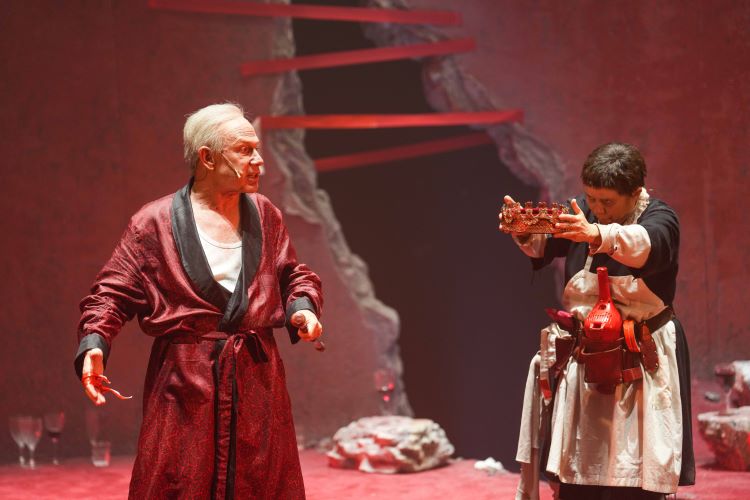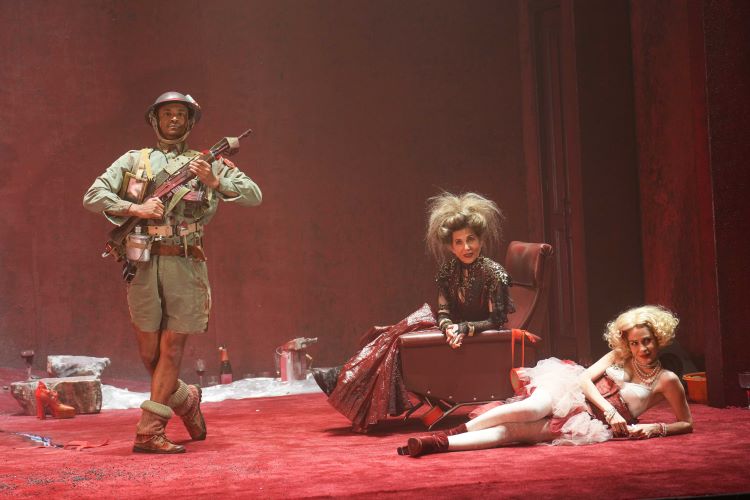
The Cameri Theatre production of Eugene Ionesco’s Exit the King is one of the most brilliant, incisive, and moving works I have seen. It is theatre at its most compelling – at once timeless, and yet crucially relevant to the current cultural and political moment. Irad Rubinstain directed, and together with Tom Chodorov translated Ionesco’s play into Hebrew with an acute sense of balance between retaining the sense and structure of the original, while conveying a message that speaks to the contemporary ear. Bold in its reference to the struggles that have taken place in Israel, the play – with its entire, outstanding, creative team – takes the viewer much farther, to an experience that is transformative, cathartic.
The one-act, absurdist tragicomedy is deceptively simple: King Berenger (Rami Baruch), after a tremendously long reign, refuses to accept that the end is finally near. Attending the king are his first wife, Queen Marguerite (Keren Mor), his current wife Queen Marie (Netta Garti), the Royal Physician (Micha Selektar), the Guard (Matan Onyameh) and vacuum in hand, the maid Juliette (Aya Granit-Shva). The set (Eran Atzmon) and costumes (Orna Smorogonski) are imaginative and rich in detail, situating the play beyond the realm of realistic eras and nations. The walls and floor are red as blood, as if the play were taking place in the innermost chamber of the heart. Like the heart, the set holds its secrets, that are revealed over the course of the action. Yet this royal chamber is a shambles, from the huge crack in the wall to the general disarray. The King, with his red bathrobe covering simple, white, underclothes, with his socks slipping down, leaning on his scepter with his crown askew, looks anything but royal. Queen Marguerite is elaborately attired, entirely covered in glittering red and black lace, her graying hair piled atop her head, while the young Queen Marie prances in fluffy bedroom slippers, clad all in white, with a body-hugging corset and asymmetrical fluffy skirt. Juliette, the Guard, and the Royal Physician, are in the uniforms of their respective professions, albeit somewhat rumpled. Their very appearance reveals volumes about the characters.

Queen Marguerite is there to make it clear to the king that he is about to die, and to help him as he approaches his death, while Queen Marie mournfully insists on protecting him (and herself) from the truth, clinging to her illusions. Rami Baruch delivers a powerful performance as King Berenger, his physicality conveying the final, trembling, faltering steps of a dying man, while his every word denies the reality. Selfish, arrogant, and superficial, he takes no responsibility for the state of his kingdom, blaming all the woes on “the previous ruler” even though he has been in power (according to Queen Marguerite – and I trust her) for 400 years. In a complex and nuanced performance, Keren Mor is sensational as she conveys the resolve and bitter wisdom of Queen Marguerite, with an almost imperceptible trace of schadenfreude at Queen Marie’s comeuppance, if not the King’s. She sees the situation clearly, and expresses the dark humor of it, yet she is the one character who takes responsibility, at least to the extent of admitting the truth, even if she must scream it. Queen Marguerite does not deny the King’s sins, yet she is still capable of compassion. Queen Marie is more of a one-dimensional character, the sexy trophy wife reluctant to leave behind the self-indulgent life she led with King Berenger and Netta Garti is adorable and funny as Marie.
There is no holding back in this scathingly clever and wildly hilarious play. Depending on one’s precise location on the political spectrum, one may experience gleeful affirmation or furious outrage as the Hebrew translation makes use of words and phrases that trigger an immediate association to a particular political figure. Note, however, that if you feel the joy of validation – prepare to be surprised by your own feelings as the play progresses. If you feel rage – my advice is to listen with patience and an open mind, there is more than one message to this play, and I believe it speaks to everyone. It is also interesting to note that some of the text that might be deemed most inflammatory is simply a direct translation of Ionesco’s original French text. When Queen Marguerite talks to Queen Marie about the disastrous state of the kingdom, saying that the soldiers refuse to serve and young people are leaving the country, those are direct translations of Ionesco: “Ses soldats ne voulaient pas se battre… Les jeunes s’expatrient en masse…” There is a strong and courageous political message here, and it is more universal than might appear upon first impressions.
In his extreme selfishness, King Berenger is the king you love to hate, and the acerbic wit and physical comedy evokes gales of laughter. Yet foolish, irresponsible, narcissistic, subverter of truth though he is, Berenger – through the combined talents of Rami Baruch, Irad Rubinstain, and Eugene Ionesco – elicits our compassion. There is a powerful scene towards the end of the play, between Juliette and Berenger, brilliantly performed by Aya Granit-Shva and Rami Baruch, in which those two extremes are communicated so precisely and poignantly. The King appears to show an interest in Juliette the maid and her life, yet as she describes her harsh existence, he reinterprets each aspect of her life as something beautiful and precious. He remains so utterly selfish and blind to the feelings of others, yet at the same time, speaks an eternal truth. The play shook me to my core as rocking with laughter throughout, seeing Berenger as a loathsome object of my disdain for his selfish, reckless, cruelty, leaving a path of destruction in his wake, I began to feel compassion for Berenger as a fellow human. Yet that compassion did not obliterate my condemnation of his actions and world view. Sustaining those contradictory feelings, acknowledging the truth of both, was a deeply emotional and inspiring experience. Knowing that one day we will meet our death – that point at which we can no longer make any more revisions or changes, Ionesco’s play reminds us of the impact of our choices, our place in history.
Exit the King
A tragicomedy by Eugene Ionesco
Translated by Irad Rubinstain and Tom Chodorov; Directed by Irad Rubinstain; Set: Eran Atzmon; Costumes: Orna Smorgonski; Original Music: Roy Yarkoni; Lighting: Avi Yona Bueno (Bambi); Choreography: Amit Zamir; Assistant Director: Cnaan Eliel; Producer: Adi Polyak; Cast: Rami Baruch – King Berenger, Keren Mor – Queen Marguerite, Netta Garti – Queen Marie, Micha Selektar – The Royal Physician, Aya Granit-Shva – Juliette, Matan Onyameh/David Bilenca – The Guard; Additional compositions & melodies: Matan Onyameh, mix – Eyal Shindler
Future performances: https://www.cameri.co.il/eng/The_Cameri_Theatre_productions/11013/Exit_the_King





